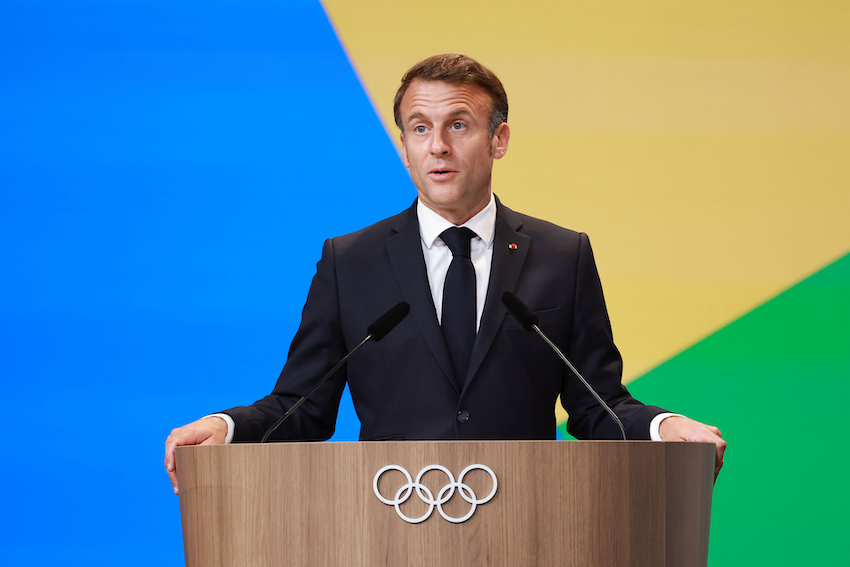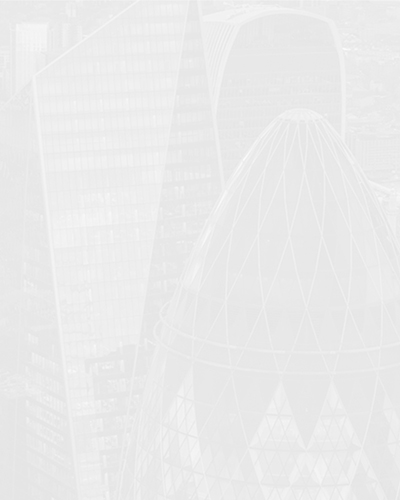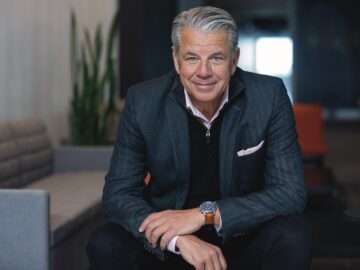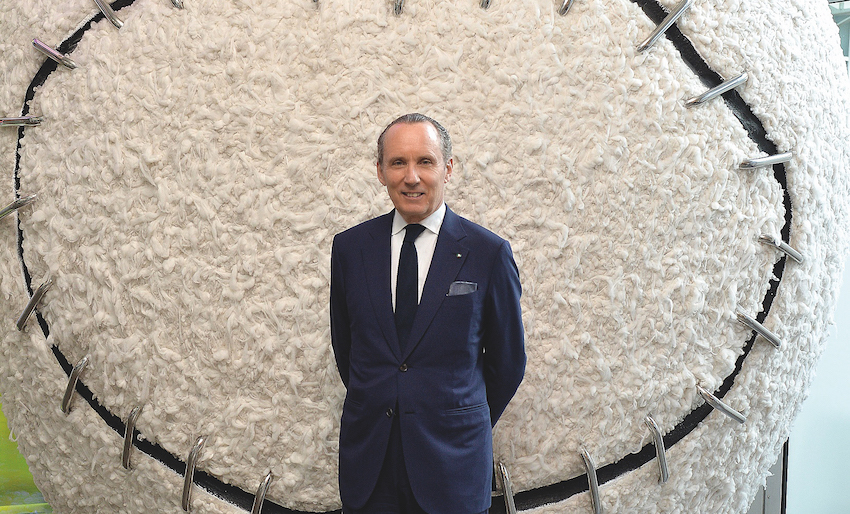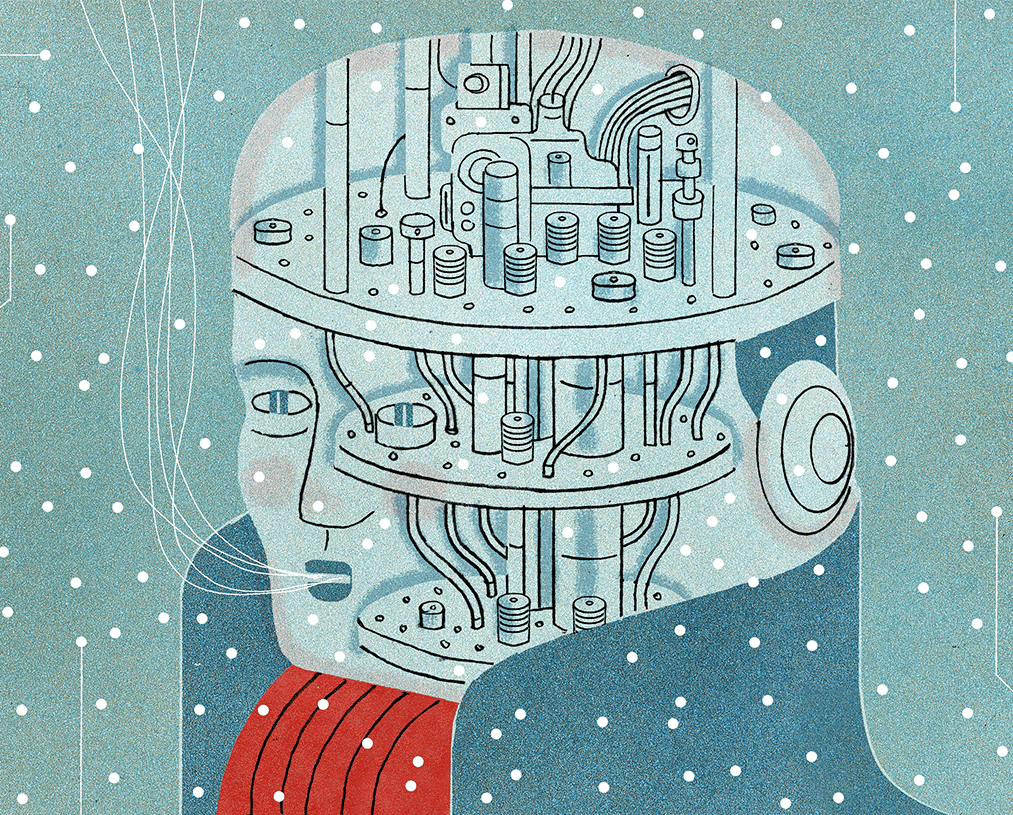The event is poised to be the high point of his turbulent, transformative presidency. Brunswick’s Philip Delves Broughton reports.
President Macron addressing the International Olympic Committee ahead of the Paris Olympic Games in July 2024.
The day after Emmanuel Macron was first elected President of France, he flew to Berlin to meet the then-German Chancellor, Angela Merkel, to shore up the relationship with his most important foreign ally. The day after that, May 17, 2017, he hosted his first delegation at the Élysée Palace: a group of inspectors from the International Olympic Committee, who were considering candidates for the 2024 summer Games.
Two months later, he made the unusual step for a national leader of traveling to the IOC’s Swiss headquarters to press France’s case again. But he did not speak solely in terms of sports. “We need multilateralism, the structures that provide agreement among nations … and tolerance, which the Olympic movement illustrates well.”
“Olympic values are our values,” he insisted. “They are threatened, called into question by many today, so it’s the best moment to defend them.”
After seven years of preparation, the fruits of Macron’s urgent sports diplomacy have blossomed across France. Vertiginous stands tilt down to the Place de la Concorde in the heart of Paris, which will host competitive skateboarding, 3×3 basketball, BMX freestyle and, new to the Games, breakdancing. Versailles will have the modern Pentathlon, the beach volleyballers will play in front of the Eiffel Tower, and surfers will compete on the other side of the world, in the waters of French Polynesia.
The Games’ opening ceremony will not be confined to a stadium, but take place in a parade along the Seine, security permitting, visible to vast crowds gathered along the banks.
To win an Olympic Games for any politician is a coup. But the way Macron did it encapsulated his style: personal, relentless, strategic, disregarding convention, and with the gut of a Vegas high roller. The event will be the high point so far of Macron’s turbulent, transformative presidency: an opportunity to show off the France he has molded over the past seven years. But given France’s current state of political discord, it is also a time when the world will scrutinize a country going through an existential moment.
Paris under Macron is a changed city. After Brexit, global banks moved key people and functions to Paris, often after Macron personally pitched their CEOs in fluent English. The tech scene, once moribund, is now the most vibrant in Europe, outpacing even London in terms of investment. The graduates of France’s elite science and engineering schools are attracting funding from Asia and Silicon Valley to their startups, many in AI. Young people from all over Europe are riding bikes and bringing new life to once scruffy parts of the city.
But every gambler must take his losses, and Macron took a bath when the far-right National Rally party surged in European elections in June and he called a snap parliamentary election. He said he wanted the French to “clarify” the political situation. What did they actually want? Had the National Rally won an absolute majority in parliament, as seemed very possible, Macron would have gone down as the president who ushered the far right into government.
Instead, voters provided clarification by rearing up in support of left-wing and centrist parties to block the National Rally from gaining an absolute majority. Macron will now have to manage and devolve to these factions for the remainder of his term, which ends in 2027. Large groups on the left and right want to reverse some of his signature measures, notably raising the state retirement age from 62 to 64, and abolishing the wealth tax.
In a good scenario, the impending parliamentary chaos will draw voters in from the extremes and remind them of the need for a more coherent government. In a bad scenario this becomes the new normal for France, a government wracked by difference and dissent, overseen by a distant president with limited powers.
But whatever happens over the final three years of Macron’s presidency, he has already led his country on quite a ride. He has freed up the economy, shattered assumptions about work and the duties of the state, and taken on forces which had defeated presidents and prime ministers before him.
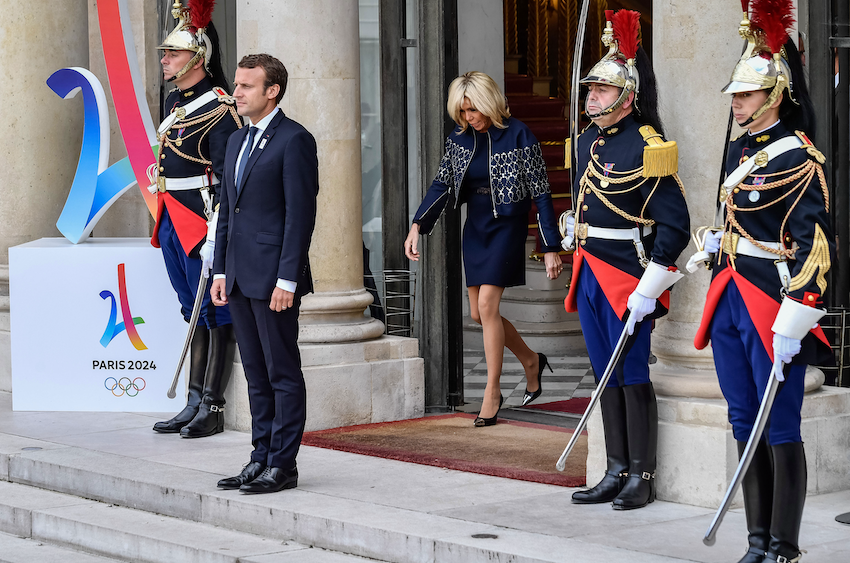
President Macron at the Elysee Palace in September 2017 for a celebratory ceremony after it was announced Paris would host the 2024 Summer Olympics.
Like him or not—and there are strong views on both sides—Macron has broken rule after rule of French political life. He was 39 when he was entered the Élysée, making him the youngest president in French history—and France’s youngest leader since Napoleon. He won election at the head of a centrist party, which he had founded just a year before, defeating an incumbent President, Francois Hollande, whom he had served closely as an adviser and finance minister.
Whereas French politicians had previously spent years rising through the ranks, building deep layers of support and expansive institutional networks, Macron blitzed his way to the top. And he did not confine himself to France.
When he spoke of the threat to the Olympics’ values in those early weeks in office, he was doing something no other European leaders dared to do: tweaking America’s new president, Donald Trump. He did so knowing he would meet Trump later that same month at a summit of NATO leaders in Brussels. Trump believed NATO’s members were not contributing enough to their own defense and was spoiling for a fight.
The Macron-Trump meeting at the summit was a peak of political theater. As they sat on the edge of their gilded chairs, Trump reached over for a handshake. Macron admitted later that he had studied videos of Trump using handshakes to establish his dominance, gripping and jerking the other person’s hand towards him. And he was ready. He took Trump’s hand and squeezed it, refusing to let Trump pull him towards him. Close-ups showed Trump’s fingers pointing down awkwardly, unable to squeeze back. Macron grinned towards the cameras holding Trump’s hand longer than necessary as Trump contained a wince. Game Macron.
Macron the strategist wasn’t going to strand the Franco-American relationship on some isolated instance of macho posturing. Instead, he flipped the script again. He invited Trump to be guest of honor at the Bastille Day parade in Paris. There was another epic handshake tussle, but Trump was delighted by the military pageantry and his place of honor, and France was back in favor.
On the global stage, as well as the domestic one, Macron has reinvented the role and presence of a French leader. Britain’s departure from the European Union, and Angela Merkel’s retirement as Germany’s Chancellor, created space for Macron to expand France’s role as the continent’s leading voice around the world on everything from security to trade to decarbonization.
In April, he gave a speech at the Sorbonne in Paris, which only he among world leaders could have given. It was long, philosophical, digressive and blisteringly frank. “The era when Europe bought its energy and fertilizers from Russia, had its goods manufactured in China, and delegated its security to the United States of America, is over,” he said.
He was as critical of his own country and continent as he was of France’s geopolitical rivals. He said Europe’s economic model was “no longer sustainable.” It is paying for a social model and implementing stringent environmental rules while its economic rivals, the United States and China, are investing more and “over-subsidizing” key industries to gain advantage.
Russia’s invasion of Ukraine, he said, had threatened the security of Europe and exposed its overreliance on a decreasingly Europhile America. Meanwhile the rise of nationalist, far-right parties across Europe, fueled by online disinformation campaigns, had pushed the continent’s political structures off balance.
“Once again, our Europe has lost its self-esteem,” said Macron. “That is strange when you look at everything it has done and what we owe it, but there it is…The risk for our Europe would be, as it were, to get used to this belittlement.”
Self-esteem, belittlement, ideas of enhancing France’s sense of its own greatness have been central to Macron’s presidency. From the moment he announced his candidacy, he was accused of aspiring to a “Jupiterian” presidency, where he acts as king of the gods, supreme, aloof, absolute. The label haunted him over time as he used every ounce of his executive power to implement his reform agenda, stirring popular opposition and eroding his parliamentary authority. The same bruising, executive approach which proved so effective in his first term has proved alienating over time, and left him politically isolated.
One of the statistics Macron most likes to cite is that growth in European GDP per capita over the past three decades has been half that in the United States. When he took office, he spoke of a new France, where businesses were relieved of regulations, foreign investors were welcomed, and where corporate and capital gain tax rates were slashed.
He quickly abolished the wealth tax on anyone with over $1.5 million in assets, which had led to France’s wealthiest stashing their assets abroad. He courted the world’s CEOs and soon the investments rolled in. He took on labor laws which dissuaded firms from hiring young people, and dared the unions to oppose him. He introduced major reforms to the education and healthcare systems. It was a blistering first 18 months, and by the end of it there was as many reeling as there were delighted by Macron’s assault on the status quo.
In November 2018, a series of online complaints about rising fuel prices had escalated into a nationwide protest, where drivers put on the yellow vests they have to carry in their cars in case of emergencies and blocked roads and fuel depots across the country. Many of the protests turned violent. Macron’s response was to launch a series of nationwide public meetings with citizens and public officials. “We won’t agree on everything, that’s normal,” said Macron announcing his plan. “But at least we’ll show that we are a people who are not afraid to speak, to exchange views and debate. And perhaps we’ll discover that we might even agree, despite our different persuasion, more often than we think.”
Macron walked into these meetings armed with facts, talking points and notebooks. He attended fourteen debates, which lasted nearly a hundred hours. He talked about everything from medical devices to animal husbandry. The Yellow Vest protests dwindled and his popularity began to rise again. Whatever they thought of him, no one could doubt his commitment to the task. His fearless and unprecedented approach to confronting his critics paid off and he was able to continue with his reforms.
Across the Seine from the spidery expanses of the Ministry of Economics, Finance and Industrial Sovereignty, which Macron once led, is a former railway yard converted into a vast campus for start-ups. Station F was the brainchild of Xavier Niel, a telecoms and technology entrepreneur. Macron opened it in June 2017, at a boisterous event which owed more to Silicon Valley than the formality of France’s business establishment.
The design was inspired by Google’s offices in Mountain View and London, vast open spaces chopped up into glass-walled offices for up to 1,000 starts ups and early-stage businesses, meeting spaces, and one of the largest restaurants in Paris built around graffiti-covered train carriages.
While there were startups in Paris before Station F, it has taken a scattered start-up scene and given it form and focus for entrepreneurs and investors from around the world. In May, Microsoft announced a €4 billion investment in AI in France, including a Station F-based project, GenAI Studio, which will give opportunities to 15 AI-focused start-ups at a time.
On the same day as Paris’ political establishment reeled from Macron’s decision to call a parliamentary election, the Paris-based AI firm Mistral disclosed that it had secured a new round of funding, valuing the year-old company at nearly €6 billion.
While valued at less than a tenth of the American AI leader, OpenAI, Mistral has generated excitement and hope that Europe can compete against the American tech giants by pitting intelligence and agility against the might of Silicon Valley. Macron has called it a symbol of “French genius.”
The Financial Times reported that Niel had told a small group of attendees at VivaTech, a huge annual technology conference each May in Paris, that “the most important change we’ve had in French tech is having a young pro-business president elected. It’s not what he actually changed that mattered the most—it’s the image of France that he completely changed.”
During the ancient Olympics, warring states would lay down their arms for the duration of the games. Macron floated a similar idea in the spring, and was backed by China’s President Xi. But neither President Putin of Russia nor President Zelensky of Ukraine said they would cooperate with an Olympic truce.
It was, nonetheless, a very Macron idea: esoteric and oddly compelling, a fusion of history, politics and events which no other world leader could have imagined. From the waters of Tahiti, to the Stade de France in Paris, and despite recent political setbacks, these will be very much his games.
More from this issue
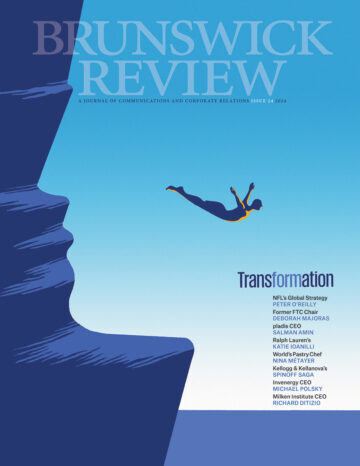
Transformation
Most read from this issue
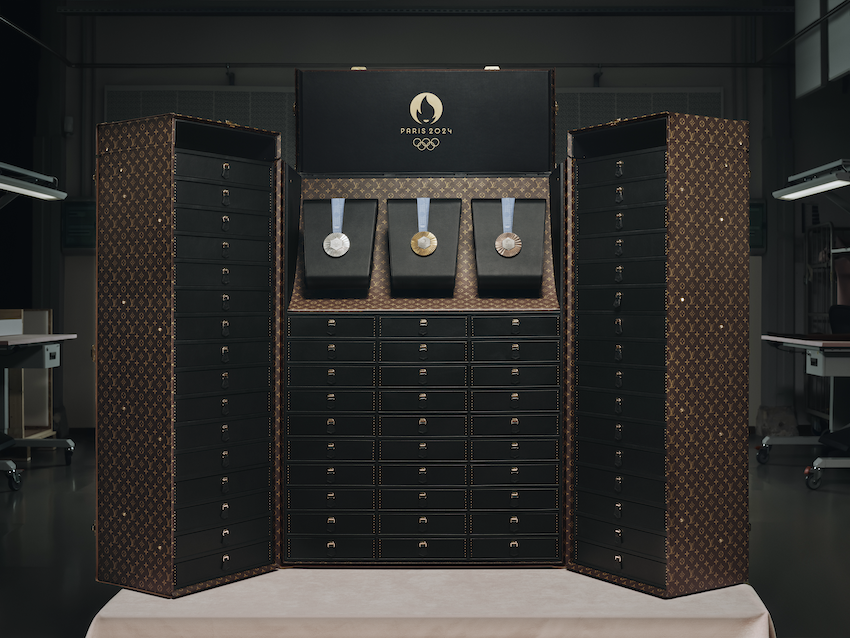
Olympian Savoir Faire

